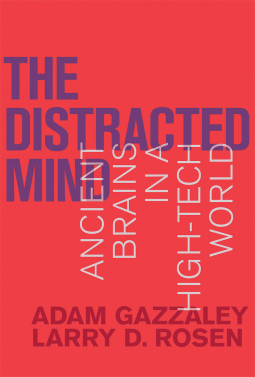
The Distracted Mind
Ancient Brains in a High-Tech World
by Adam Gazzaley; Larry D. Rosen
This title was previously available on NetGalley and is now archived.
Send NetGalley books directly to your Kindle or Kindle app
1
To read on a Kindle or Kindle app, please add kindle@netgalley.com as an approved email address to receive files in your Amazon account. Click here for step-by-step instructions.
2
Also find your Kindle email address within your Amazon account, and enter it here.
Pub Date Sep 23 2016 | Archive Date Mar 02 2017
MIT Press | The MIT Press
Description
"Brilliant and practical, just what we need in these techno-human times."—Jack Kornfield, author of The Wise Heart
Most of us will freely admit that we are obsessed with our devices. We pride ourselves on our ability to multitask—read work email, reply to a text, check Facebook, watch a video clip. Talk on the phone, send a text, drive a car. Enjoy family dinner with a glowing smartphone next to our plates. We can do it all, 24/7! Never mind the errors in the email, the near-miss on the road, and the unheard conversation at the table. In The Distracted Mind, Adam Gazzaley and Larry Rosen—a neuroscientist and a psychologist—explain why our brains aren't built for multitasking, and suggest better ways to live in a high-tech world without giving up our modern technology.
The authors explain that our brains are limited in their ability to pay attention. We don't really multitask but rather switch rapidly between tasks. Distractions and interruptions, often technology-related—referred to by the authors as “interference”—collide with our goal-setting abilities. We want to finish this paper/spreadsheet/sentence, but our phone signals an incoming message and we drop everything. Even without an alert, we decide that we “must” check in on social media immediately.
Gazzaley and Rosen offer practical strategies, backed by science, to fight distraction. We can change our brains with meditation, video games, and physical exercise; we can change our behavior by planning our accessibility and recognizing our anxiety about being out of touch even briefly. They don't suggest that we give up our devices, but that we use them in a more balanced way.
Advance Praise
—Jon Kabat-Zinn, founder of Mindfulness-Based Stress Reduction (MBSR); author of Coming to Our Senses and Full Catastrophe Living
“Gazzaley and Rosen’s work is brilliant and practical, just what we need in these techno-human times.”
—Jack Kornfield, author of The Wise Heart
“The Distracted Mind by Adam Gazzaley and Larry D. Rosen is a highly engaging read of how we cognitively pursue our goals and how our brains have to frequently overcome internal and external interference, including that from modern technologies, to do this successfully. The book includes excellent, clear examples of what these problems of goal interference are and how they might affect us in our daily lives. It is a very informative and extremely interesting read, which is strongly recommended for all those with an interest in neuroscience, psychology, and the impact of technology on society.”
—Barbara J Sahakian, Professor of Clinical Neuropsychology, Department of Psychiatry and Behavioural and Clinical Neuroscience Institute, University of Cambridge; coauthor of Bad Moves
“The book strikes an outstanding balance between cutting-edge scientific knowledge and practical suggestions for effectively coping with today’s unprecedented technological demands, which result in distracted minds at all ages and make us want to believe in the myth of multitasking.”
—Pat DeLeon, former President of the American Psychological Association
Available Editions
| EDITION | Other Format |
| ISBN | 9780262034944 |
| PRICE | $17.95 (USD) |



